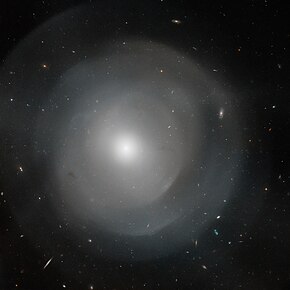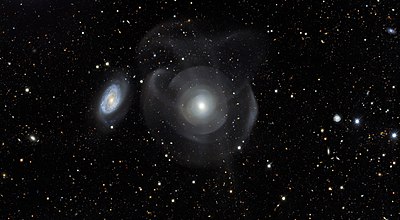NGC 474
| NGC 474 | |
|---|---|
 A Hubble Space Telescope image of NGC 474 | |
| Observation data (J2000[1] epoch) | |
| Constellation | Pisces[2] |
| Right ascension | 01h 20m 06.7s[1] |
| Declination | +03° 24′ 58″[1] |
| Redshift | 0.007755[1] |
| Heliocentric radial velocity | 2325 km/s ±7 km/s[1] |
| Galactocentric velocity | 2398 km/s ±7 km/s[1] |
| Distance | ~100 Mly (~31 Mpc)[2] |
| Characteristics | |
| Type | S0[3] |
| Size | 250,000 ly (diameter)[4] |
| Other designations | |
| Arp 227, MCG 0-4-85, PGC 4801, UGC 864, ZWG 385.71[3] | |
NGC 474 is an elliptical galaxy about 100 million light years distant in the constellation Pisces. This large galaxy is known to possess tidal shells[5] and tidal tails, although their origins remain unclear.[2] One possible explanation is that NGC 474 interacted with a galaxy several billion years ago.[6]
Structure
The origins of the spectacular tidal features around NGC 474 have been extensively studied, and some possible explanations have been published. The authors of one study argued that the tidal tails were formed because of a collision with a galaxy 2 billion years ago.[6] The same study also stated that NGC 474 is absorbing gas from its neighbor, NGC 470, since the ancient collision. [6] In another model, the tidal shells can be explained by a gas-rich spiral galaxy colliding with NGC 474 twice, before finally merging.[5] NGC 474 is moving away from the Sun at a rate of 2412 km/s due to dark energy.[7]

In July 2017 a Type Ia supernova designated SN 2017fgc was discovered in NGC 474.[8] It was located at a considerable distance from the galactic nucleus.[9]
Further reading
- Turnbull, A. J.; Carter, D.; Bridges, T. J.; Thomson, R. C. (1999) Shell Formation in NGC474
References
- ^ a b c d e f "NED results for object NGC 0474*". NASA/IPAC Extragalactic Database. Retrieved 2011-02-26.
- ^ a b c Schirmer, Mischa. "NGC 474". Archived from the original on 2011-06-29. Retrieved 2011-02-26.
- ^ a b "Revised NGC Data for NGC 474". The Interactive NGC Catalog Online. Retrieved 2011-02-26.
- ^ "Galaxy NGC 474". NASA Astronomy Picture of the Day. Retrieved 2018-02-07.
- ^ a b Bílek, Michal; Fensch, Jérémy; Ebrová, Ivana; Nagesh, Srikanth T.; Famaey, Benoit; Duc, Pierre-Alain; Kroupa, Pavel (2022). "Origin of the spectacular tidal shells of galaxy NGC 474". Astronomy & Astrophysics. 660: A28. arXiv:2111.14886. Bibcode:2022A&A...660A..28B. doi:10.1051/0004-6361/202141709. S2CID 244729604.
- ^ a b c Alabi, A.B.; Anna, F-M.; Forbes, D.A.; Romanowsky, A.J.; Brodie, J.P. (September 2020). "NGC 474 as viewed with KCWI: diagnosing a shell galaxy". Monthly Notices of the Royal Astronomical Society. 497 (1): 626–631. arXiv:2007.01870. doi:10.1093/mnras/staa1992.
- ^ Guide, Universe. "NGC 474 - Facts about the Galaxy in Pisces". Universe Guide. Retrieved 2022-05-20.
- ^ "SN 2017 fgc". Transient Name Server. Retrieved 9 February 2018.
- ^ King, Bob (2017-07-26). "Sky Surprises: New Comet ASASSN1, Nova in Scutum, and Supernova in Pisces!". Sky & Telescope.
External links
 Media related to NGC 474 at Wikimedia Commons
Media related to NGC 474 at Wikimedia Commons- Galaxy NGC 474: Cosmic Blender, NASA Astronomy Picture of the Day (8 October 2007)
- Shell Galaxies in Pisces, NASA Astronomy Picture of the Day (27 February 2011)
- Galaxy NGC 474: Shells and Star Streams, NASA Astronomy Picture of the Day (5 January 2014)
- Galaxy NGC 474: Shells and Star Streams, NASA Astronomy Picture of the Day (6 February 2018)
